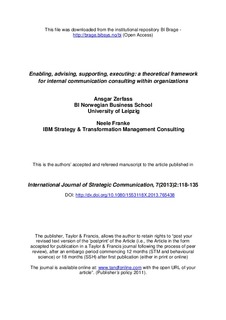Enabling, advising, supporting, executing: a theoretical framework for internal communication consulting within organizations
Journal article, Peer reviewed
Permanent lenke
http://hdl.handle.net/11250/93974Utgivelsesdato
2013Metadata
Vis full innførselSamlinger
- Scientific articles [2181]
Originalversjon
http://dx.doi.org/10.1080/1553118X.2013.765438Sammendrag
This article analyzes the consulting and enabling function within the role set of communication managers and provides an initial theoretical framework for internal communication consulting in organizations. The idea of communication professionals as consultants and enablers of communication has already been introduced by a number of researchers. Nevertheless, the necessity of this task as well as the specific dimensions and practices of internal communication consulting and its various objectives, forms, and specifications have not been elaborated until now. This article takes an initial step towards closing this gap by developing a theoretical framework based on research in business consulting and existing public relations role models. After a short introduction (section I), the necessity of the consulting function will be emphasized by introducing the concept of the communicative organization, in which managing relationships by communication is part of every employee’s job profile (section II). In order to fulfill this requirement, communicative competencies in a much broader sense than traditional business and interpersonal communication have to be developed on a broad scale. This leads to a new challenge for communication professionals: they are asked to advise organizational members regarding communicative topics and to enable them to resolve communication-related issues as well as task-related issues (section III). Based on a review of the relevant streams of research in different disciplines, a framework for internal communication consulting has been constructed by combining the dimensions of consulting
2
forms and objectives (section IV). Qualitative interviews with communication executives of
major European organizations have been conducted to verify the breadth and plausibility of this
framework (section V). The article closes by outlining implications for the research, education,
and practice of public relations (section VI).
Beskrivelse
This is the authors’ accepted and refereed manuscript to the article
